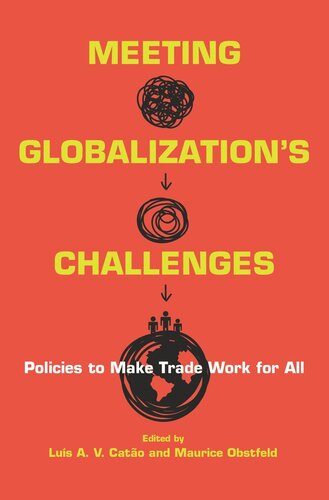

Most ebook files are in PDF format, so you can easily read them using various software such as Foxit Reader or directly on the Google Chrome browser.
Some ebook files are released by publishers in other formats such as .awz, .mobi, .epub, .fb2, etc. You may need to install specific software to read these formats on mobile/PC, such as Calibre.
Please read the tutorial at this link: https://ebookbell.com/faq
We offer FREE conversion to the popular formats you request; however, this may take some time. Therefore, right after payment, please email us, and we will try to provide the service as quickly as possible.
For some exceptional file formats or broken links (if any), please refrain from opening any disputes. Instead, email us first, and we will try to assist within a maximum of 6 hours.
EbookBell Team

4.4
12 reviewsAn honest and ambitious debate among the world's top economists about the real costs and consequences of globalization.
Leading economists propose solutions to the problems of globalization
Globalization has expanded economic opportunities throughout the world, but it has also left many people feeling dispossessed, disenfranchised, and angry. Luís Catão and Maurice Obstfeld bring together some of today's top economists to assess the benefits, costs, and daunting policy challenges of globalization. This timely and accessible book combines incisive analyses of the anatomy of globalization with innovative and practical policy ideas that can help to make it work better for everyone.
Meeting Globalization's Challenges draws on new research to examine the channels through which international trade and the diffusion of technology have enhanced the wealth of nations while also producing unequal benefits within and across countries. The book provides needed perspectives on the complex interplay of trade, deindustrialization, inequality, and the troubling surge of nationalism and populism—perspectives that are essential for crafting sound economic policies. It tackles the vexing issue of how to most effectively compensate globalization's losers and reintegrate them into job markets. The book also explores how to design social insurance policies that can mitigate the risks posed by automation and offshoring, such as mass unemployment and its inherent dangers to democracy.
With a foreword by International Monetary Fund Managing Director Christine Lagarde and a history-rich synthesis by Catão and Obstfeld of main policy takeaways, Meeting Globalization’s Challenges features contributions by Ufuk Akçiğit, Edward Alden, François Bourguignon, Angus Deaton, Rafael Dix-Carneiro, Jeffry Frieden, Gordon H. Hanson, Keyu Jin, Lori G. Kletzer, Anne Krueger, Paul Krugman, Nina Pavcnik, Andrés Rodríguez-Clare, Dani Rodrik, Michael Trebilcock, Laura D. Tyson, Martin Wolf, and Ernesto Zedillo.